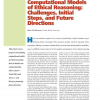Free Online Productivity Tools
i2Speak
i2Symbol
i2OCR
iTex2Img
iWeb2Print
iWeb2Shot
i2Type
iPdf2Split
iPdf2Merge
i2Bopomofo
i2Arabic
i2Style
i2Image
i2PDF
iLatex2Rtf
Sci2ools
EXPERT
2006
2006
Computational Models of Ethical Reasoning: Challenges, Initial Steps, and Future Directions
on abstract principles that you can't easily apply in a formal, deductive fashion. So, the favorite tools of logicians and mathematicians, such as firstorder logic, aren't applicable. Second, throughout intellectual history, philosophers have proposed many theoretical frameworks, such as Aristotelian virtue theory,1 the ethics of respect for persons,2 act utilitarianism,3 utilitarianism,4 and prima facie duties,5 and no universal agreement exists on which ethical theory or approach is the best. Furthermore, any of these theories or approaches could be the focus of inquiry, but all are difficult to make computational without relying on simplifying assumptions and subjective interpretation. Finally, ethical issues touch human beings profoundly and fundamentally. The premises, beliefs, and principles that humans use to make ethical decisions are quite varied, not fully understood, and often inextricably intertwined with religious beliefs. How do you take such uniquely human char...
Related Content
| Added | 12 Dec 2010 |
| Updated | 12 Dec 2010 |
| Type | Journal |
| Year | 2006 |
| Where | EXPERT |
| Authors | Bruce M. McLaren |
Comments (0)

